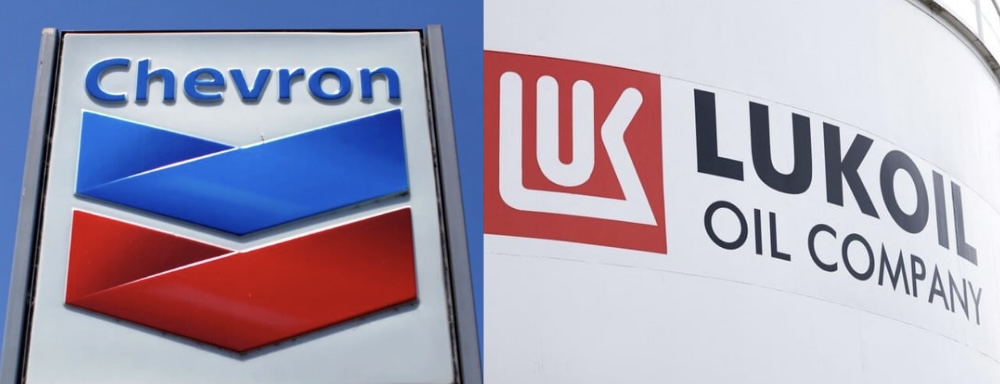KEY POINTS
- Chevron is exploring selective acquisitions of Lukoil’s overseas assets after the US authorised talks with the sanctioned Russian producer.
- Lukoil’s portfolio includes refineries, oilfield stakes in Kazakhstan and Nigeria, and fuel networks worldwide, valued at more than 20 billion dollars.
- Multiple bidders, including Carlyle, are reviewing parts of the portfolio as Washington increases pressure on Moscow and accelerates divestment of Russian holdings.
Chevron has begun sounding out the possibility of acquiring parts of Lukoil’s global portfolio after Washington gave potential buyers room to hold talks with the sanctioned Russian oil producer, according to several people familiar with the early discussions.
The US major is reviewing specific assets where both firms already operate side by side rather than pursuing a takeover of Lukoil’s full international footprint, which spans refineries in Europe, oil and gas blocks in the Middle East and Central Asia, and fuel retail networks in multiple continents.
People close to the process say Chevron’s interest is still at an exploratory stage but represents one of the clearest signs yet that US authorities are encouraging an orderly divestment of Russian energy interests caught up in sanctions.
US authorisation opens door for piecemeal deals as buyers circle Lukoil portfolio
Lukoil has long held minority stakes in fields in Kazakhstan, including 13.5 percent of Karachaganak and 5 percent of Tengiz, both of which count Chevron, Exxon Mobil, Shell and Eni among their shareholders. Crude from the region flows to global markets through the CPC pipeline system, a corridor responsible for roughly 1.5 percent of worldwide oil supply.
The Russian group also has a stake in Nigeria’s offshore OML-140, operated by Chevron, and owns assets in Iraq, Mexico, Ghana, Egypt and Uzbekistan. Three European refineries and hundreds of petrol stations round out a foreign portfolio Lukoil says produces about 0.5 percent of global oil output. The company has previously indicated it wants to dispose of these positions, which were valued at around 22 billion dollars last year.
Chevron has not previously been identified as a suitor. It declined to comment on the matter, saying only that it complies with all relevant laws and will not discuss commercial deliberations. The individuals describing the talks asked not to be named because they are not authorised to speak publicly.
Their account suggests Chevron is one of several bidders assessing opportunities created by the latest round of US sanctions. Private equity group Carlyle was earlier linked to the potential carve-up of Lukoil’s international operations.
Washington’s tightening stance has already pushed some parts of the portfolio into uncertainty. In Finland, Lukoil-owned petrol station operator Teboil said this week it expects a change in ownership. In Iraq, officials confirmed they are seeking a temporary sanctions waiver to allow more time for the Russian company to exit West Qurna 2, one of the country’s major oil developments. Iraq has ruled out stepping in as buyer.
Lukoil was targeted last month alongside Rosneft as part of efforts by the Biden administration to increase pressure on Moscow and steer it back towards negotiations over Ukraine. The clearance granted last week for potential buyers to begin talks marks one of the most consequential shifts in US policy since those sanctions were announced.
What remains unclear is how quickly any transactions might proceed. The overlap between Chevron’s existing interests and Lukoil’s minority stakes may make some assets comparatively easier to transition, but the geopolitical sensitivities and the number of regulators involved could stretch timelines well into next year.
For now, the opening created by the US Treasury has triggered a race for assets that, despite their scattered geography, hold strategic weight in the global flow of crude. Whether Chevron decides to seize the opportunity, or leaves the field to private equity and regional players, will become clearer as formal negotiations take shape.



